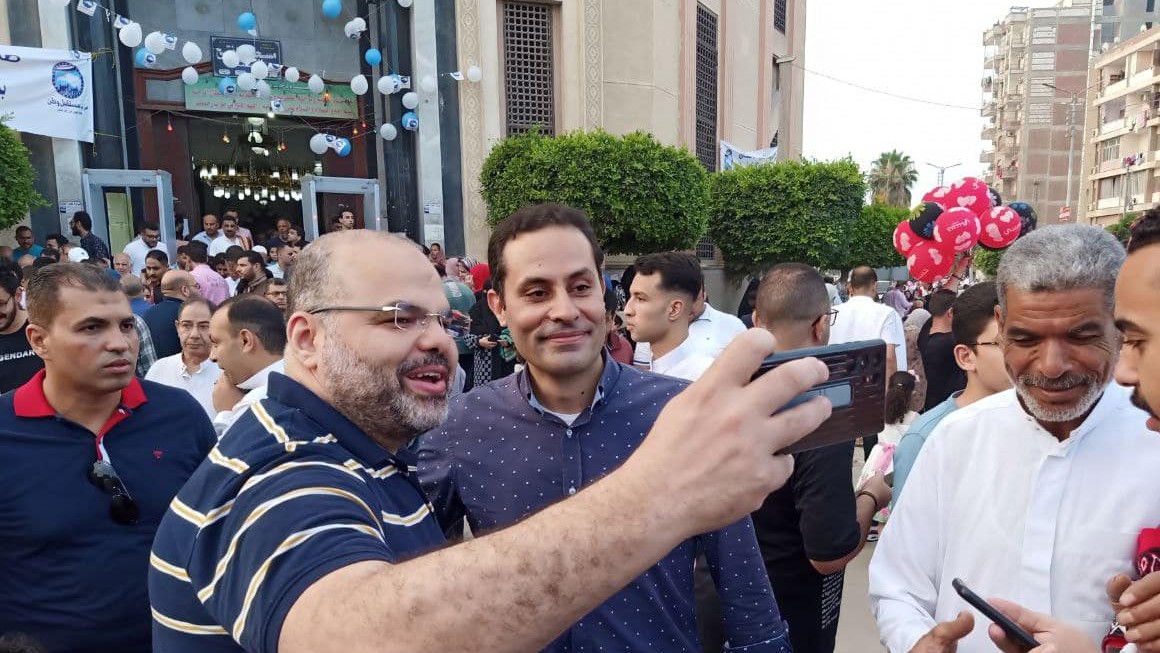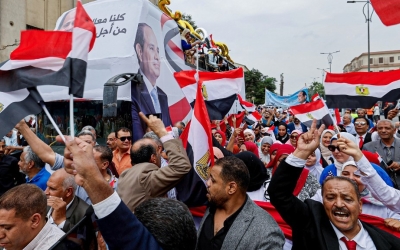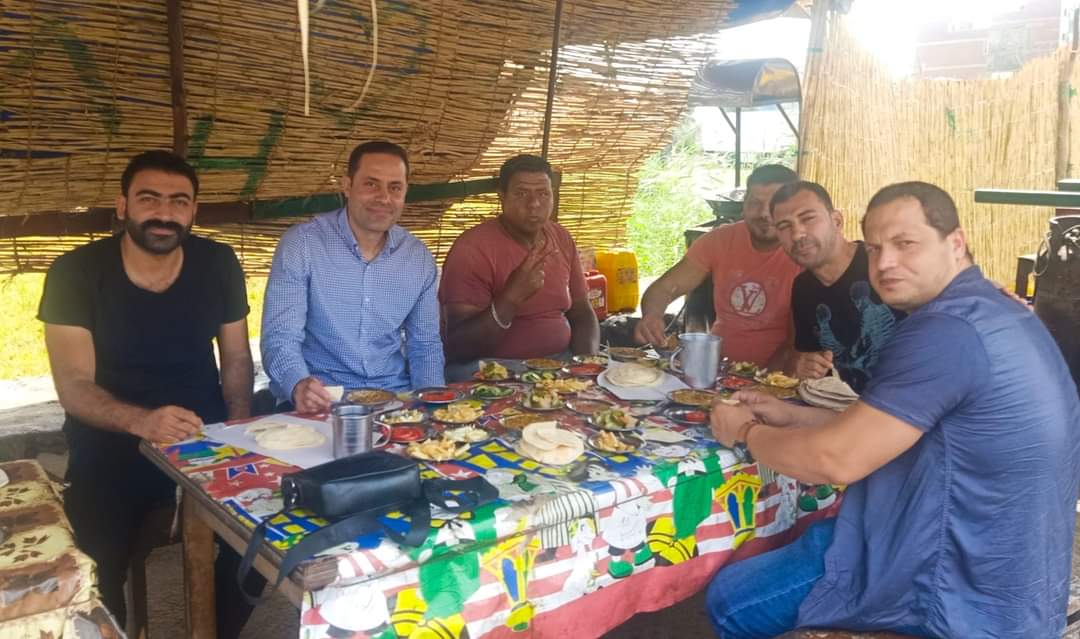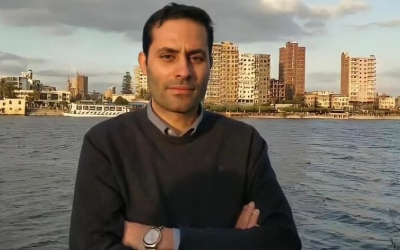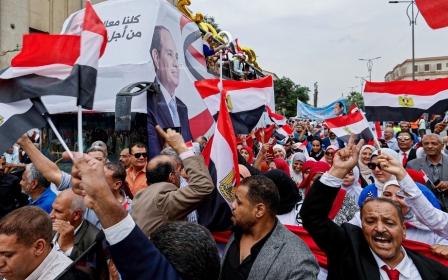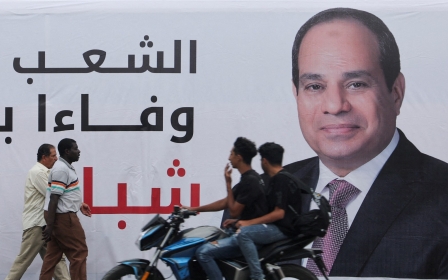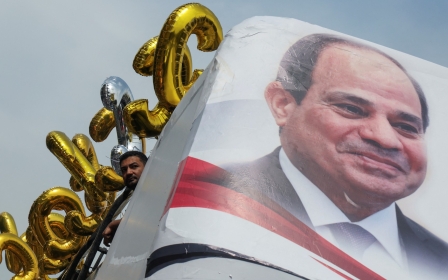Ahmed Tantawy: The presidential challenger making waves in Egypt
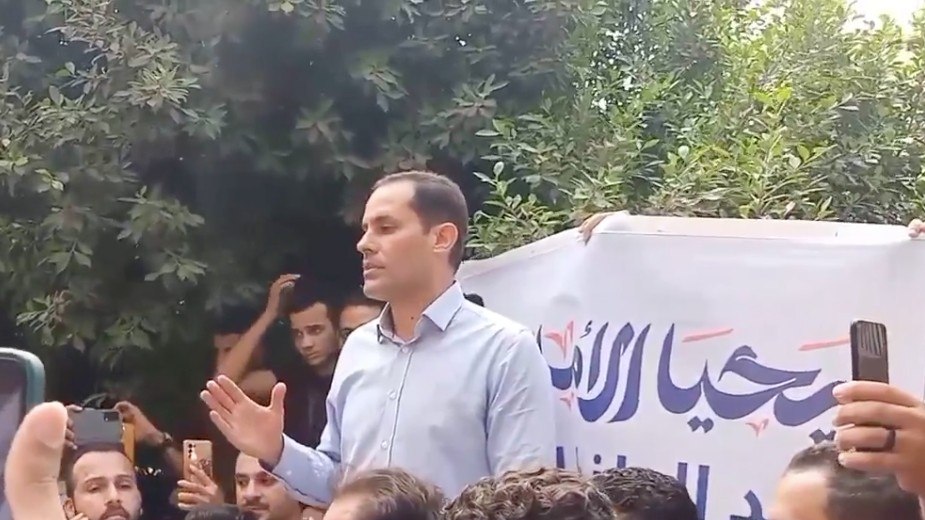
As Egyptian President Abdel Fattah el-Sisi is set to run for his third term in the December presidential elections, aided by the support of the army and state institutions, left-wing presidential hopeful Ahmed Tantawy is undeterred by restrictions on his campaign.
The National Elections Authority (NEA) announced last month the dates for the polls, scheduled for 10-12 December, with nominations for the elections set to be confirmed between 5-14 October.
According to the NEA's regulations, in order to be accepted as a presidential candidate, the candidate must be endorsed by at least 20 members of the House of Representatives or be supported by no fewer than 25,000 citizens across 15 governorates who have the right to vote, with a minimum of 1,000 from each governorate.
But Tantawy, the most prominent opposition candidate, has accused the government of blocking his supporters from registering endorsements, and holds Sisi responsible.
“Every day, our supporters queue in front of registry offices, from morning till night, and go home without being able to file their nominations,” Tantawy told a gathering of supporters in Damietta on Wednesday.
New MEE newsletter: Jerusalem Dispatch
Sign up to get the latest insights and analysis on Israel-Palestine, alongside Turkey Unpacked and other MEE newsletters
Meanwhile, evidence shows that the Sisi campaign has been forcing people, including millions of civil servants and recipients of government benefits, to endorse Sisi for president, according to testimonies received by Middle East Eye.
Tantawy, a 44-year-old former MP, has faced continuous harassment since his decision to come back from self-imposed exile in Lebanon in May to run for president.
'We are dreaming on a grand scale, hoping for transformative change and the cessation of oppression'
- Abdel Rahman, campaign member in Alexandria
His family members, campaign volunteers and lawyers have been detained in a campaign denounced by rights groups as politically motivated. Additionally, his mobile phone was hacked multiple times between May and September, which the University of Toronto-based Citizen Lab attributed to the Egyptian government.
Tantawy, formerly the chair of the Nasserist al-Karama party (Arabic for Dignity), has been known for vocal criticism of the Sisi government in recent years, especially during his tenure as a member of the House of Representatives from 2015 to 2019.
In August 2022 he resigned from al-Karama after less than two years as chairman, subsequently relocating to Beirut for eight months, due to reported pressure from security agencies who aimed to silence his critique of the Sisi government.
Tantawy and his team are aware of the risks associated with their work, yet they say they have set their sights on a significant goal.
Abdel Rahman, a campaign member from Alexandria, acknowledged the danger, saying to Middle East Eye, "Of course, we realise that we are under constant surveillance and that detention could easily befall us. Some of us have even stopped residing in our own homes, fearing arrest and the harassment of our families, as if we were criminals.
"We are dreaming on a grand scale, hoping for transformative change and the cessation of oppression that has systematically impoverished the Egyptian people for the benefit of a select few," he added.
Born in 1979, Tantawy hails from the Nile Delta governorate of Kafr el-Sheikh. He studied accounting at Mansoura University then earned a diploma in information systems management from the Arab Academy for Science and Technology, a postgraduate diploma in political science from Cairo University, and a master's degree in political science.
In 2009, Tantawy entered the political arena by becoming the secretary of al-Karama Party in the village of Qallin, and he was elected to the party's political bureau in 2012. He also contributed to the party newspaper, where he headed the politics section.
However, Tantawy fell out with party leader Hamdeen Sabahi in 2014, when the latter ran in the elections. The vote was widely regarded as lacking genuine opposition to Sisi and was viewed by Tantawy as a sham that served only to legitimise the 2013 military coup and downplay its violent consequences, according to sources close to him.
‘I don’t like the president’
In 2015, Tantawy embarked on a parliamentary campaign in Qallin and in the city of Desouk, both located in the Kafr el-Sheikh governorate.
His electoral bid pitted him against affluent, pro-government families who had wielded significant financial resources for years, ensuring their representation in the legislative branch, whether through the National Democratic Party under President Hosni Mubarak or Sisi's political arm, the Nation's Future Party (NFP).
During this campaign, Tantawy reached out to disenfranchised young people, as well as small landowners and business owners. Overcoming entrenched political structures and powerful familial connections, Tantawy succeeded in securing seats for supporters of the 2011 revolution in a parliament criticised for being a rubber-stamp body.
Nonetheless, gaining recognition beyond the impoverished and marginalised Qallin proved to be a challenge.
Tantawy's effective yet composed public speaking skills played a pivotal role in this regard, as his speeches were widely viewed on social media, including during live broadcasts of parliamentary sessions.
His stances on critical issues, such as opposition to normalisation with Israel, wealth redistribution, tax increases, and continued deals with the International Monetary Fund (IMF), resonated with a growing audience of young people and members of the opposition. However, these positions also drew animosity from the pro-government press and other pro-state MPs.
Notably, Tantawy was one of the few members of parliament who publicly condemned the Tiran and Sanafir maritime demarcation deal, which saw the Egyptian government relinquish sovereignty over the two islands to Saudi Arabia.
His vocal opposition to the 2019 constitutional amendments, which paved the way for Sisi to run for a third term, established him as the most outspoken critic of the president within parliamentary ranks.
In one session, he expressed his disapproval of the president, stating, "I don't like the president, and I do not trust his performance, and I am not satisfied with it. This is my right as an Egyptian citizen before being a member of parliament."
Saied, who gave only his first name for security reasons, has been collaborating with Tantawy since he became an MP, and said that members of the campaign view him as "another young Egyptian man who has shared in all their victories and defeats since 2011.
“Tantawy is distinct in that he does not align himself with any particular ideological group, be it Islamist or military, and he lacks the financial resources to buy support. He hails from a low-income background,” Saied added.
'Let us not eat or drink'
Despite Sisi's crackdown on prospective candidates in the two previous elections, and the risk of detention, Tantawy continues to speak out against the president.
He called out Sisi after the latter's statement that Egyptians should accept the prospect of going hungry as the price of the country's success.
“Don’t you Egyptians dare say you would rather eat than build and progress,” Sisi said last week, a day before announcing his candidacy. “If the price of the nation’s progress and prosperity is to go hungry and thirsty, then let us not eat or drink,” he added.
Sisi also called his opponents “liars, saboteurs and wicked”.
'Egyptians actually starved during your rule because of your administration. They did not see any of the development that was promised'
- Ahmed Tantawy responds to Sisi on X
In response, Tantawy condemned the president's speech, writing on X: "Egyptians actually starved during your rule because of your administration. They did not see any of the development that was promised."
Tantawy further accused Sisi of spreading lies and accumulating "high-rise buildings, cities and palaces built in deserts, even if it is at the expense of [the ordinary] man and his right to a decent life and education.
"[The government] has stripped citizens of social protection, leaving two-thirds of Egyptians living below and around the poverty line, while the conditions of most of the remaining third have deteriorated dangerously," he said.
The presidential election will take place as Egypt, home to over 109 million people, is in the midst of a severe economic crisis that has seen the Egyptian pound lose half its value against the dollar, leading to record inflation and foreign currency shortages.
In August, annual inflation reached close to 40 percent, according to official figures, plunging Egyptians further towards or under the poverty line.
While the financial crisis has a range of causes, including the Covid-19 pandemic and the Russia-Ukraine war, opposition figures and economic analysts have pointed fingers at the increasing grip the military has held over the economy following Sisi's 2013 coup.
Using constitutional means
Tantawy’s campaigners insist they seek to challenge Sisi by constitutional means, unlike many opposition voices that question the legitimacy and feasibility of the entire process.
“We respect the elections and the constitution, but we challenge the government and the presidency as our political opponents,” Saied told MEE.
“Our legitimacy comes from local political work that is not dependent on capital nor on connections in the deep state.”
On the ground, Tantawy's supporters face considerable challenges as they endeavour to connect with the wider population.
Saied has criticised what he perceives as "overt bias" within state institutions, particularly in favour of certain candidates, a reference to Sisi. He elaborated by saying, "Once a state official becomes aware of our affiliation with Tantawy's campaign, they often obstruct our efforts, whether they are judges, hotel receptionists, or even cafe workers within governmental institutions."
Despite these obstacles, Saied emphasised that the campaign has persevered, attempting to organise tours of constituencies in Upper Egypt in early July. However, they were met with a setback, as all their accommodation reservations were unexpectedly cancelled.
These factors, along with administrative restrictions, have indeed impacted their efforts. Nevertheless, they remain undeterred, conducting extensive outreach by travelling to as many as four or even five governorates in a single day to engage with the public and garner support.
While Tantawy has not yet officially unveiled his electoral platform, Saied outlined its core pillars, which include political reform and democratic transition, economic reform and social justice, legislative and institutional reform, human rights, public freedoms, as well as national security and national interests. He emphasised that these are not mere empty slogans but concrete goals integral to their campaign.
A member of Tantawy's campaign in Mansoura, who chose to remain anonymous, said that their strength derives from grassroots efforts: "The authorities fear the campaign because it is based on a grassroots movement that enjoys the support of thousands of young people, workers, students, retirees, and individuals who were previously apolitical but have now recognised that their livelihoods are at risk if they do not step forward."
Despite the grassroots support, the volunteer noted that neither state-owned nor privately controlled newspapers, websites or television programmes have reached out to Tantawy for interviews or statements, highlighting the challenges faced by the campaign in gaining media exposure.
Reservations
In addition to an increasing popular support from grassroots groups, Tantawy's campaign gained the support of many figures, such as the outspoken historian Khaled Fahmy, professor Yehia al-Qazzaz, politician Hamdeen Sabahi, the Socialist People's Alliance Party, and al-Karama Party.
However, some of the supporters, who asserted the importance of his political work to challenge the military structure, have shared some reservations about his programme.
For example, Khaled Fahmy denounced some of Tantawi's statements regarding personal rights. In an interview with Egyptian independent website al-Manassa, Tantawy hinted that as a president he is obliged to follow the constitution and law, even if they can limit others’ sexual and religious freedoms.
'Tantawy is distinct in that he does not align himself with any particular ideological group, be it Islamist or military'
- Saied, campaigner
Citing the crackdown and limiting the freedom of Baha’is and homosexuals, Fahmy said: “It was clear that Tantawy was repeating his general idea and the image that people want to see him with… [as] a civil servant whose role is to abide by the constitution and implement the law. But he does not ask himself about his role as president when he inherits unjust laws that may be against the constitution.”
Other intellectuals and activists have also voiced reservations over the authenticity of the elections and the effectiveness of Tantawy’s participation.
Egyptian novelist Alaa Al-Aswany, for example, has questioned why the leftist candidate still insists on running, despite the fact that the state has ignored his requests to ensure a fair and unbiased electoral process.
Other criticisms Tantawy faced came from women's rights activists who pointed out that in August 2016, during his tenure as MP, Tantawy rejected the sentencing of doctors who perform female genital mutilation (FGM).
At the time, he compared FGM to a tonsillectomy. However, in a recent interview he appeared to retract his statement, described the practice as "wrong and harmful" and asserted that he meant that if there is a medical or surgical need to perform this operation, then the general law should not prohibit it.
“It is possible that I have made a mistake and I am not ashamed to confess that I was wrong... I have three daughters that never underwent FGM.”
However, despite his own reservations, Fahmy argued: “Tantawy is not condescending, he stands with the people shoulder to shoulder. [He is] ready to listen, learn, and review his ideas."
He also acknowledged that Tantawy is "ready to work hard to build a civilian campaign: he goes out into the street, meets people, trains young men and women to organise efforts to collect nomination petitions, and builds a team of experts to help him write his programme.”
Middle East Eye delivers independent and unrivalled coverage and analysis of the Middle East, North Africa and beyond. To learn more about republishing this content and the associated fees, please fill out this form. More about MEE can be found here.


